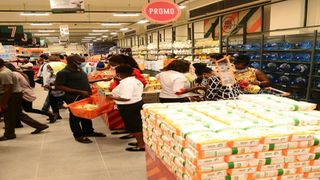
Shoppers at Naivas supermarket in Ongata Rongai Kajiado County on December 11, 2020.
| Salaton Njau | Nation Media GroupNews
Premium
Costly festive season as food prices rise
What you need to know:
- Super petrol, diesel, and kerosene will retail at Sh106.82, Sh91.82 and Sh83.56 respectively in Nairobi following the increases by Epra.
- Data from the Kenya National Bureau of Statistics indicates that prices for some products had started increasing by end of November.
Antony Njenga, a shopkeeper in Timboroa, Baringo County, has raised selling prices of most basic household commodities more than twice in less than one month, after similar increases by his suppliers.
Today, a carton of cooking oil, which he bought at Sh1,100 last month, costs about Sh1,250, a bundle of wheat flour which sold for Sh1,300 goes for between Sh1,450 and Sh1,500 and a 50kg packet of sugar, which cost as low as Sh4,300, is now priced at Sh5,000.
"As a result, I have had to adjust prices upwards for the affected commodities when I sell to my clients in retail packages. The suppliers increased prices this month," Mr Njenga told the Nation.
Supermarkets have also increased prices for several basic household commodities that a majority of Kenyans use on a daily basis, pointing to an expensive Christmas in a year that saw millions lose their jobs, shut down their businesses and take pay cuts due to the Covid-19 pandemic.
Super petrol
In its December monthly price review, the Energy and Petroleum Regulatory Authority (Epra) announced increases in pump prices of super petrol, diesel, and kerosene; which are expected to translate into higher transportation charges and increased cost of goods and services.
A two-kilogramme packet of Kabras sugar that cost Sh218 at Naivas and Quickmart supermarkets on September 8, 2020 has shot up to about Sh225, a spot check by the Nation this week revealed.
The Soko maize flour brand has risen to Sh186 from about Sh116 three months ago while three litres of Fresh Fry cooking oil is selling at Sh624 up from Sh521 in September. Pure Mwea Pishori rice was retailing at Sh440 for a 2kg packet from Sh369.
Second-hand clothes
The cost of imported second-hand clothes has also been affected. Mr Muturi Kariuki, the chairman of Kamukunji Traders Association in Nairobi, told the Nation that the recent poor performance of the Kenyan shilling against the dollar has increased costs that businesspeople incur while purchasing their products from outside the country.
"When you combine the impact of the extra cost brought about by the Kenyan shilling's poor performance and the additional levy on our products by the government, it means that a pair of shoes which used to cost Sh300 has now gone up to Sh500," said Mr Muturi.
He said the situation is forcing some businesses to cut on imports, terming market conditions as untenable. "Normally this is usually the peak season but now the market performance is very poor, we are only getting few clients buying in small quantities, while those who used to buy wholesale are no longer coming," he said.
Data from the Kenya National Bureau of Statistics (KNBS) indicates that prices for some products had started increasing by end of November.
KNBS's market study in November showed that the price of wheat flour had risen from Sh118 to Sh119 on average compared to October, beef from Sh439 to Sh443, mutton and goat meat from Sh527 to Sh529 and offals (matumbo) and milk had risen by a shilling over the same period.
The data also indicated that by last month, inflation in the country was at the same rate as was in May, when Covid-19 had cut supply chains, at 5.33 per cent. This is the highest rate it has gone since the easing of restrictions in the country in August. In October, the inflation rate was at 4.84 per cent.
Expensive Christmas
By this week, fares to different parts of the country remained fairly constant, with public service vehicles to destinations such as Nakuru and Nyeri charging Sh500. But the prices are expected to shoot up as Christmas Day draws closer.
This turn of events has left Kenyans to face a broke and expensive Christmas. For the past 14 years, boda boda operator Newton Bwaku religiously travelled back to his native Busia County to enjoy Christmas with family members.
But, for the first time in over a decade, the father of three will not be travelling home and will spend Christmas in Naivasha, at his place of work. "It is not tenable to travel given that schools are reopening immediately after the festivities. What I am able to save is purely for settling school fees."
If he travelled, Mr Bwaku would have spent more than Sh20,000 on the trip, using the cash on transport, shopping and other expenses. "With three children, my wife and a sister, I would have spent Sh7,000 on fare to travel home and a similar amount to return to Naivasha," he said.






